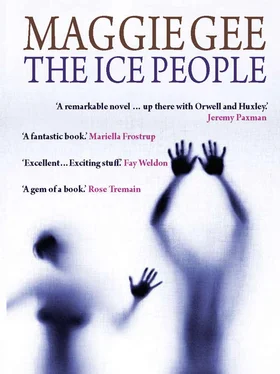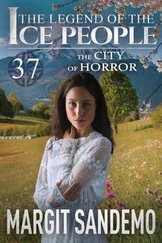Maggie Gee - The Ice People
Здесь есть возможность читать онлайн «Maggie Gee - The Ice People» весь текст электронной книги совершенно бесплатно (целиком полную версию без сокращений). В некоторых случаях можно слушать аудио, скачать через торрент в формате fb2 и присутствует краткое содержание. Год выпуска: 2008, Издательство: Telegram Books, Жанр: Фантастика и фэнтези, на английском языке. Описание произведения, (предисловие) а так же отзывы посетителей доступны на портале библиотеки ЛибКат.
- Название:The Ice People
- Автор:
- Издательство:Telegram Books
- Жанр:
- Год:2008
- ISBN:нет данных
- Рейтинг книги:4 / 5. Голосов: 1
-
Избранное:Добавить в избранное
- Отзывы:
-
Ваша оценка:
- 80
- 1
- 2
- 3
- 4
- 5
The Ice People: краткое содержание, описание и аннотация
Предлагаем к чтению аннотацию, описание, краткое содержание или предисловие (зависит от того, что написал сам автор книги «The Ice People»). Если вы не нашли необходимую информацию о книге — напишите в комментариях, мы постараемся отыскать её.
imagines an ice age enveloping the Northern Hemisphere. It is Africa’s relative warmth that offers a last hope to northerly survivors. As relationships between men and women break down, the novel charts one man’s struggle to save his alienated son and bring him to the south and to salvation.
Maggie Gee
The White Family
The Flood
The Ice People — читать онлайн бесплатно полную книгу (весь текст) целиком
Ниже представлен текст книги, разбитый по страницам. Система сохранения места последней прочитанной страницы, позволяет с удобством читать онлайн бесплатно книгу «The Ice People», без необходимости каждый раз заново искать на чём Вы остановились. Поставьте закладку, и сможете в любой момент перейти на страницу, на которой закончили чтение.
Интервал:
Закладка:
Our school had very few black people. Remember, this had recently been countryside, and most black people preferred the city. There were Italians, Asians, Swedes … And fifty or a hundred kids were probably mixed race, many of them good friends of mine. We hung out together, liked the look of each other, followed Renk and Roots music avidly, but no one mentioned what we had in common. And what was there, really, to mention? We were mostly third or fourth generation British, all with more white in us than black. Yet I think I longed to be recognised. That hidden part of me was waiting to be seen.
Which was partly why I fell in love with Sarah, a dozen years later, when I was twentyfive.
I came to central London when I was eighteen, and lived in a hostel near Regent’s Theme Park. It was noisy, but I liked the freedom. Samuel’s police career had ground to an end, without leaving him better off or happier. Now he disapproved if I played the wrong music or brought a friend home or used a dreampad to relax after work. Mum, who was retraining as a nurse, explained to Dad that the new way was safer, the little silver pads we stuck on the skin so the drug was absorbed straight into the bloodstream. ‘But why do you need drugs?’ Samuel would demand, pouring himself another cold beer.
(It’s like a dream, to remember those days, when you could flick what you wanted from any dispenser. Now we can’t even get hold of painkillers, and one of my teeth has been throbbing for days … I wish I had one of those old silver dreampads. I’d slip its coolness on to my skin. Then the slow rush, the sweet slide forwards, flying away from stress and pain.
Finished. Gone. There are no more escapes, except through lighter fuel or cleaning fluids, which every so often the wild boys try. Then there is mayhem, fire and death, and Chef and I creep away and hide … Such beautiful, desirable words: aspirin, somnifer, paracetamol, diamorphine, tenebrol, heroin, lullane. Lulling us away from hurt and grief. We grew used to them, and then we lost them.
Now I suppose the only drugs are stories. That’s why the kids still look to me. They see I’m writing. They’re curious. Don’t you see, you boneheads, I’m Scheherezade? I’ll spin out my story night after night, hamming, stalling, to save my life –
Scheherezade! Don’t make me laugh. None of them knows what I’m talking about. It’s a world ago, the Arabian Nights my mother used to read to me, the Bible, Dickens, Hans Andersen… What a waste, what a shame, the old twists, the old tales, all of them lost on these little savages. Vile little shits, ignorant brutes, spitting out their elders like chickenbones, I’d like to kick them to the back of beyond …
No use, no use. Too many of them.
Now Kit is offering me a leg. ‘Take it, old man! Save it for you!’ Long, fringed with blackened, gamey meat, glistening in the light of the fire, its shape unpleasantly familiar. Sometimes I eat, but today I’m not hungry. I want to feel human, as I once was. I wave placatingly. Back to my story.)
In the early 2020s I lived in central London. I was happy because it was so different from home. Walking the streets until the cool of the early hours, dancing in the squares, by the river, on the pavements. Teen life had come out of the molelike tunnels where the young liked to hide at the beginning of the century.
My generation did things differently. We travelled everywhere, easily as swallows, we students with money from waiting tables, on cheap, safe airlines that competed for our business. The countries we flew to still had governments. Lisbon, Reykjavik, Beijing — we saw the world, packed in like sardines. Everywhere we danced to the same music. And the smaller towns were even better. There you could dip into the twentiethcentury, a time when each place had its own special taste. That quiet square in Avila. Cool pale beer, smoky black olives. The townspeople were dark like me; there were darkeyed girls in bright satin dresses …
(Euro got bad in my early twenties. There were three years of plague that closed the frontiers, a new kind of Ebola coinciding with haemorrhagic sleeping sickness; blazing summers when viruses flourished and civil order couldn’t stand the strain as hundreds of victims bled to death in their cars, choking the roads to hospitals. Our government fell, and was barely replaced. Looking back, my late teens were paradise.)
We young ones chose to live in the open, though our parents hardly left their homes, hiding behind electronic gates. We ate in the sun; we danced in the sun. We laughed at the old — we called them ‘the slows’, and sometimes ‘the bits’, for all their spare parts — with their cautious, waxy masks of whitish suncream. When the evening came, we mobbed the streets.
We liked to be under the orange sky, with the flaring thunder clouds above us. We waited for the little chill of morning, the slight but miraculous lessening of heat that slipped in with the breezes of three or four am, so that people lying clammy and bare on their beds would reach out in their sleep and pull up a sheet. Outside, the kids drew closer and threw arms round each other, enjoying being young together … I was happy, whether cool or hot, and slept as little as I could. We were all hotblooded, we were raised on heat. I loved fiery middays and baking afternoons, and the long, familiar nakedness of summer evenings, when no one under thirty ever wore a shirt.
Yet my body was strangely illadapted to heat. I was hairy, unlike my father. I had a thick pelt of curling dark hair which ran down my chest and across my shoulders, and defined the strong muscles of my legs in shorts. Some women were fascinated by it, and would stare, letting me see them noticing. Others were shocked, even a little disgusted, for the fashion was for shaving, of heads and bodies.
Why was that? Hard to recall now, but it lasted for decades, that egglike baldness. Perhaps it was a kind of streamlining, an attempt to keep cool at any cost. And the style appealed to both men and women. The fashion of the time was for androgyny, so hair was suspect, for it signalled gender.
And yet, though our clothes and hair denied it, a great gap had grown up between the sexes. Segging we called it. From segregation. Almost everything we did was segged. Girls with girls, boys with boys, great droves of animals bypassing each other, eyes darting across, wild in the neon, jostling, signalling, twisting through the night, two big streams that couldn’t make a river.
The problems with fertility had started to get worse. The screens were full of alarming statistics. They didn’t mean all that much to the young, who were too busy having fun to think that having children mattered, but our parents discussed it in solemn voices. They wanted grandchildren. They wanted a future.
I knew, in any case, with that complete confidence that young people have once, then never again, that these reports weren’t about me. I wasn’t like them. I wouldn’t have a problem. I knew I was a man who wanted women. When I had had sex (which wasn’t very often because it wasn’t easy to get women to have sex, what with segging, and mutant hivs) the pleasure was huge, easy, instinctive. It seemed so natural, like having children.
I felt on the brink of owning the world. I was a man, and human beings ran the planet. There were eight billion of us, though numbers were shrinking, but few other animals were left to compete. Insects, bacteria, viruses. (And cats, of course. Cats everywhere. The city streets were patched with fur, ginger, tabby, blackandwhite. I liked cats though, so that was all right.) I was tall, and strong, and a techie, which qualified me for a lifetime’s good money. It was new and wonderful to feel like this; home had too many small sadnesses.
Читать дальшеИнтервал:
Закладка:
Похожие книги на «The Ice People»
Представляем Вашему вниманию похожие книги на «The Ice People» списком для выбора. Мы отобрали схожую по названию и смыслу литературу в надежде предоставить читателям больше вариантов отыскать новые, интересные, ещё непрочитанные произведения.
Обсуждение, отзывы о книге «The Ice People» и просто собственные мнения читателей. Оставьте ваши комментарии, напишите, что Вы думаете о произведении, его смысле или главных героях. Укажите что конкретно понравилось, а что нет, и почему Вы так считаете.












